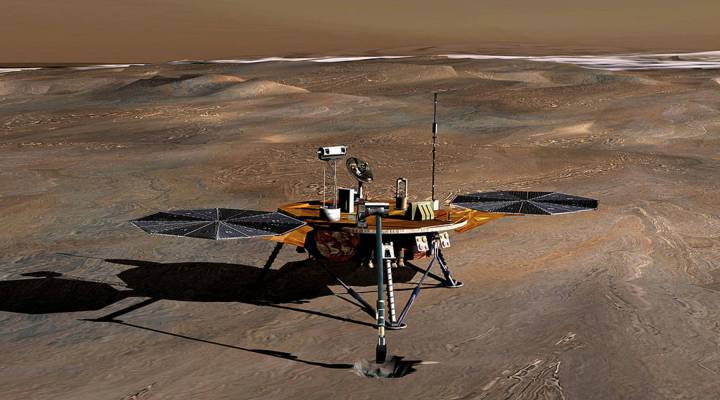
The economics of colonizing Mars

As we get closer to life on Mars, we have to start thinking about what its economy would look like and how that might affect the rest of us here on Earth. There are plenty of creatives who have already been doing lots of brainstorming about this. Science fiction writer Kim Stanley Robinson is one. Marketplace Tech host Molly Wood talked with him about what colonizing the red planet might look like and how — or even if — that would be profitable. An edited transcript of their conversation follows.
Molly Wood: Who do you think will be the first colonists on Mars, and what will that look like?
Kim Stanley Robinson: The first colonists on Mars I now think will be modeled kind of on Antarctica. So it will be scientific crews and people who keep the infrastructure going. For a long time it might be considered to be an exotic place where we don’t need to change it. But as soon as people commit to living there for their entire lives, they’re going to want to give the place an atmosphere to protect themselves from radiation.
| NASA is testing supercomputers to send to Mars |
| Reaching Mars is a hard sell, but not impossible |
Wood: The first book in the trilogy is so detailed in the story of colonization. It almost reads like a history. Do you watch the conversations that are happening now around Mars colonization and think either, “You’re welcome,” or “I already wrote this” or “I can see how this is going to play out from here”?
Stanley Robinson: Well, I wrote my book based on the exploratory work of a group called The Mars Underground, a bunch of graduate students in planetology that were at first based at the University of Colorado in Boulder. I don’t need to be thanked. I’m just the telephone operator that plugs in the various voices and they speak. I am very interested in the current talk about Mars. It’s actually very hard to land softly on Mars, and we only have about a 50 percent success rate with our robots. And also since I wrote my Mars books, we’ve discovered that the surface is way more poisonous than we thought it was. So there are slower-downers in the whole program of going to Mars that a lot of people that have read my books or have the dream from some independent source, they don’t want to acknowledge.
Wood: There’s a lot of exploration of economics in the trilogy and obviously in the new book, too, “2140.” You envision these giant corporations that essentially have all the power. Take exploration from a scientific commercial exercise. It seems our current environment, political environment and otherwise, suggests that companies will be a key part of colonizing other planets. What do you think are the dangers of that?
Stanley Robinson: Oh, I think the dangers are of trivialization, that suddenly other planets in space, instead of being a commons that all humans are interested in equally as a scientific project to humanity, it just turns into another source of profit and exploitation. It’s crazy and nobody likes it. People love those first tiny little rovers on Mars because they were public projects and everybody had a stake in it. That said, nobody can make a profit in space except for communications satellites in lower orbit. Everything that’s on Mars, everything that’s on the moon and the asteroids, exactly the most common stuff that we have here and it’s stupendously expensive to go up there, get it and bring it back.
Listen to our extended interview with Kim Stanley Robinson here.
There’s a lot happening in the world. Through it all, Marketplace is here for you.
You rely on Marketplace to break down the world’s events and tell you how it affects you in a fact-based, approachable way. We rely on your financial support to keep making that possible.
Your donation today powers the independent journalism that you rely on. For just $5/month, you can help sustain Marketplace so we can keep reporting on the things that matter to you.












